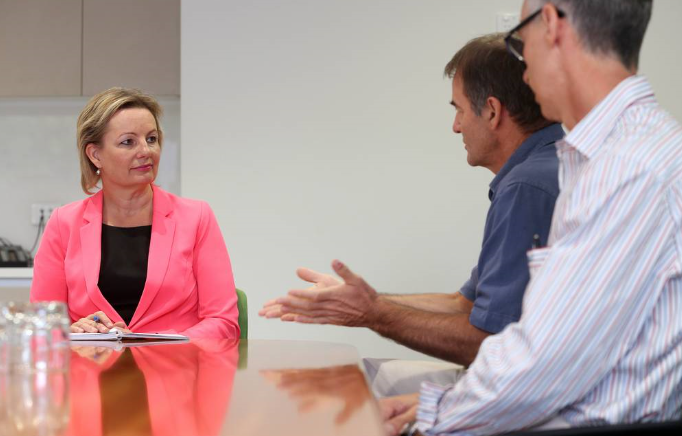
HEALTH Minister Sussan Ley is making good on her vow to consult with doctors ahead of further changes to Medicare — and she’s started in her own backyard.
The Farrer MP yesterday met GPs from Albury and Wodonga in the first of a series of round-table discussions with doctors on the ground.
And those invited to the meetings — including GPs from seven Border clinics — were optimistic following their meetings that common ground could, and would, be found in the stalemate over changes to Medicare.
The government was forced to rethink its GP co-payment and $20 rebate cut following widespread condemnation, prompting Ms Ley to promise further public consultation.
Dr Michael Bartram, of The Doctors at Lavington and the Albury After-Hours Clinic, said the government needed to get “the balance right” in their move toward more user-pays”.
“We in general practice are acutely aware of the inefficiencies of the system … it’s a great system of access and it’s probably taken for granted a bit,” he said.
“But we shouldn’t tend toward the US system where if you don’t have the income, you don’t have the care. That would be a disaster in my view.”
Principal doctor at Albury’s Gardens Medical Group, Dr Graeme Davey, echoed Dr Bartram’s sentiment that while Medicare changes were necessary, protection for the most disadvantaged was non-negotiable.
“There will be some bulk-billing clinics that will find it tougher, but I don’t think that’s such a bad thing — Medicare is not sustainable if everything is bulk-billed,” he said.
Medicare was not the only issue raised — Dr Davey questioned the logic in replacing Medicare Locals with primary health networks, leaving Albury “in an area now bigger than Sussan’s electorate”, while Dr Phillip Steele, of the Federation Clinic in Wodonga, said GP training programs in regional areas needed to be maintained.
“If you have well-trained general practitioners then you save on Medicare — well-trained doctors order fewer tests, prescribe fewer medications, and work hard on preventative medicine rather than just treating the disease when it arises, meaning fewer visits overall,” he said.
Dr Bartram said Ms Ley had showed “good leadership” in organising the meetings: “It’s pretty obvious there was not much consultation (with doctors) happening, so this is a big step-up”.
Ms Ley said she was “not reflecting on what’s come before”, when asked if the government ought to have consulted more widely on Medicare in the first instance.
“As the incoming Health Minister I looked at the landscape, and I talked with my colleagues and it was a team decision to take this approach,” she said.
“I know a lot of local doctors, I know they’re going to be frank with me and these discussions need to be frank and fearless,” she said.
Ms Ley said the government was looking at putting a price signal, or, as she said, “value signal”, on health.
“If people have to pay something for a service they tend to value it more and buy into the process more,” she said.
Ms Ley said the timetable for consultations was constrained by the May budget and changes scheduled to come into effect in July.
“We’re talking weeks here, not months,” she said.
